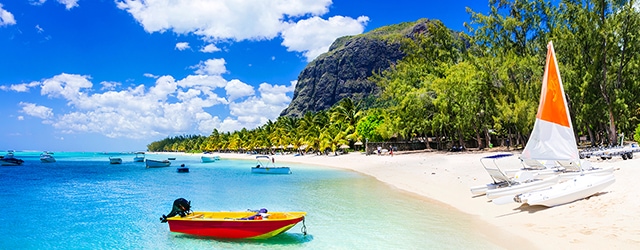Mauritius is hoping to parlay its record as a wealth haven and FDI magnet into a new, knowledge-based economy and financial hub for Sub-Saharan Africa.

Mauritius, the tiny island nation in the Indian Ocean, has lately been a magnet for foreign direct investment (FDI). FDI rose to $490.9 million in 2017 from $381.5 million in 2016, according to the Mauritian government, propelled by political stability, low taxes, a legal and regulatory framework favorable to business, and fiscal policy that earns a nod from multilateral institutions like the World Bank. Indeed, the World Bank, in its Doing Business 2018: Reforming to Create Jobs report last fall, named Mauritius the best economy in Sub-Saharan Africa in which to do business.
Now, Mauritius—its economy dominated for centuries by sugar production, then in the 1990s by textile and clothes manufacturing and more recently by financial services and tourism—is aiming to diversify its economy and extend the reach of its lively financial-services sector into the African continent. The government is now hoping to attract knowledge-based companies in artificial intelligence, blockchain technology, fintech, medical science, film and aquaculture.
Urban upgrades are also on the list as part of the government’s Urban Regeneration Scheme to redevelop existing cities as “smart cities,” including the capital of Port Louis, which it plans to upgrade in stages under the New Port Louis project. At the same time, China’s Shanxi Investments Group is developing the Jinfei Economic Trade and Cooperation Zone, a complex the government hopes will attract high-tech tenants and more investors.
Mauritius-based Bank One has significant operations in Madagascar, Kenya, Rwanda and Tanzania through its shareholders, CIEL Group and I&M Holdings. Another local bank, SBM Holdings Group, has acquired two Kenya lenders, one of which was in receivership. The deal, which enables SBM to join the ranks of tier 2 banks, will test the proposition that its geographic presence in the Asia-Africa corridor can attract significant business in a market dominated by a handful of mainly local banks.
“Mauritius is certainly a model of economic success as well as political and social stability,” says Ravneet Chowdhury, CEO of Bank One. In recent years, economic growth has averaged nearly 4% despite upheavals across the continent it lies closest to. Unemployment is among Africa’s lowest, at 7.1%, and per capita GDP has risen to more than $22,000, according to the IMF, from $400 at independence five decades ago; yet the inflation rate, estimated at 4.3% during the 2017-18 financial year, is forecast to decline to around 3.5% in the current year. Given its small geographical size and a population of just under 1.3 million, estimated nominal GDP of $13.4 billion in 2017 constitutes a boom.
Smart Leadership
Mauritius poses its share of risks for investors. Public debt, which stood at $8.4 billion in June, is projected to rise to $9 billion by June of next year. Overdependence on imports—about a third from China and India alone—raises questions about the economy’s ability to withstand shocks—whether worldwide, continentwide or sub-Saharan.
“Mauritius is relatively exposed to the global economic environment,” observes Chowdhury. Dependence on the EU for investment and foreign-exchange earnings, for instance, means that the country coughs whenever Europe gets a cold.
But the government appears confident, as do investors flocking to the island. As of May, foreign currency reserves stood at their highest recorded level, $6.2 billion, representing some 10.7 months of import cover, whereas the average across sub-Saharan Africa is 4.5 months.
“Proactive economic management is a key hallmark of the Mauritian government,” says David Rogovic, assistant vice president and analyst at Moody’s Investors Service, which recently reaffirmed the nation’s Baa1 stable rating. That reputation goes back decades now, as “successive governments have set a path of economic development through diversification, stability and business facilitation,” adds Anthony Leung Shing, senior partner and tax leader at PwC Mauritius.
Those policies, along with its status as a middle-income nation, have served to bring in some companies that have been slower to expand on the continent. Mauritius is one of only five African countries where fast-food chain McDonald’s operates. Tiffany & Co and apparel maker Del Sol are also in Mauritius, with only other African presence in South Africa.
From Haven To Hub
However, the emergence of Mauritius as an FDI destination and a regional financial-services hub also owes a great deal to the government’s staunch belief in a market-driven economy based on minimal regulatory supervision—and a low-tax regime that critics say borders on facilitating international tax avoidance and evasion. The top corporate and personal income tax rate is 15%; there is no inheritance or capital gains tax.
Some say this translates into a deliberate move by the government to look the other way, while its financial sector uses the islands as a tax-haven conduit. Mauritius is signatory to a network of investor protection agreements that guarantees protection of assets and facilitates movement of capital.
Foreign companies, accordingly, have descended on Mauritius in droves. A report by South Africa–based think tank Brenthurst Foundation noted 21,500 offshore businesses and nearly 930 global funds domiciled in the islands.
Some of these companies—particularly financial institutions—are using Mauritius as a base for serving the rest of Africa. About 60% of companies currently incorporated there operate across the continent. Banks, like SBM in Kenya, are moving in to battle for the niche created by international banks that exited in the wake of the 2007-08 global financial crisis.
“Mauritian banks are seeing Africa as a springboard for further growth beyond the confines of the relatively small domestic market, which has one of the highest financial inclusion rates in Africa,” says Chowdhury. It’s this bid to grow from a tax haven into a regional financial hub—whether it pays off or not—that has investors paying attention to the latest economic transformation of this small but nimble country.



